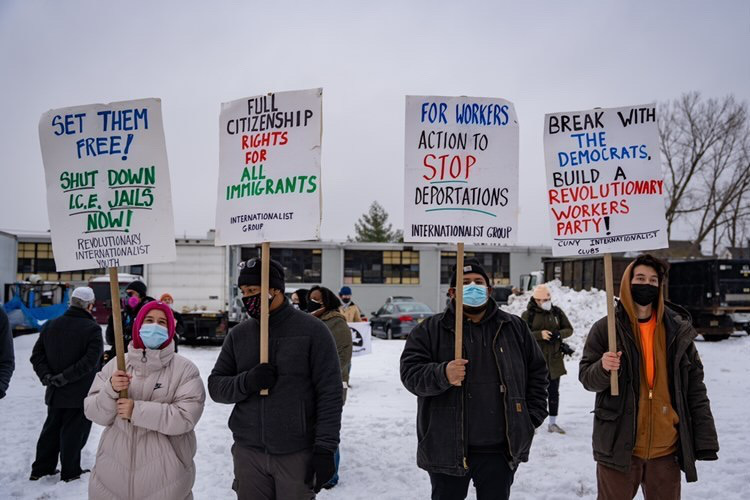The interviews in this article were originally published in Gothamist on December 13, 2020.
In late November, a group of protestors demanded the release of ICE detainees at the Bergen County Jail. During the month of January, tensions between police and demonstrators escalated.
A handful of ICE detainees had gone on hunger strikes to demand release over fears of contracting COVID-19. A hunger strike is a method of nonviolent protesting in which participants fast to demand political change. Many hunger strikers complained of unsanitary conditions and minimal medical care. Local activists took notice of the hunger strike, sparking daily protests.
During December, a video of officers acting aggressively towards protesters was published. The protestors had refused to move out of the area when asked by officers. Bergen County Sheriff Anthony Cureton responded a day later, claiming that certain protesters had offended and assaulted officers, trespassed onto jail property, and blocked traffic, forcing the police to retaliate.
Multiple people were arrested before a stand off between #AbolishICE protesters and sheriffs outside Bergen County Jail where ice detainees have been on hunger strike for 30 days.
Video by @ScooterCasterNY (FNTV) desk@freedomnews.tv to license https://t.co/LaPdlnh898 pic.twitter.com/DeJMBaxmOD
— @SCOOTERCASTER (FNTV) (@ScooterCasterNY) December 12, 2020
“Despite efforts to deescalate the situations, protesters continued their resistance, moving barricades — throwing bricks, spitting, spraying officers with pepper spray, and even biting two officers,” said Cureton. He was quick to allege that those arrested and charged with offenses were “inciting civil unrest.”
On the same day, officers in riot gear stood in formation in front of the jail. Though outnumbered, protesters chanted for the abolition of ICE. Local activist Madeline Trimble spoke to Gothamist, claiming that maintaining ICE jail beds in Bergen County, rather than cancelling Bergen County’s contract with ICE, will lead to more unjust arrests of undocumented individuals. “By participating in this process, by having this contract, Bergen County and its entirely Democratic-led county government is enabling ICE to detain and deport more people,” she said, “it’s as simple as that and it’s time to end the contract right now.”
Rabbi Rachel Kahn, a Jewish human rights activist, told Gothamist that “the first step is raising the visibility of this issue… Most of my friends and neighbors didn’t know about this issue before we began protesting, and now they can ask people they voted for why they allowed this to happen.”
When the top two Democrats in New Jersey — Senator Cory Booker, and Senator Robert Menedez — demanded their Democratic allies in county government to end ICE contracts, the movement appeared to gain crucial support from two powerful forces. Menendez even echoed a phrase common among protestors, calling revenue garnered from ICE “blood money.”
Although he claims to have participated in countless civil rights protests and Black Lives Matter rallies, he regards the hunger strike protest crackdown as different. “What occurred yesterday was not a peaceful protest,” Cureton told Gothamist, “It was not a productive act of political expression. What we saw yesterday was not, in the words of my hero John Lewis, ‘good trouble.’” He also shared that he is not an advocate of President Trump’s strict deportation policies, and hopes that President-elect Biden’s ICE would merely “focus on those who have truly been a menace to our society.”
Sheriff Cureton denied the allegations of poor jail conditions and claimed that his own home was targeted by protestors, with “Free Them All” being painted on his garage. “Any notion that I would allow the violations of anyone’s civil rights, including denying medical treatment, poor sanitary conditions, forced starvation, or heat deprivation as claimed by many over social media, is unacceptable and contrary to my many years of being a civil rights activist,” he told Gothamist.
Video of protests on Sunday, December 6.
Sayumi Baduge
Staff Writer
Photo: Julian Leshay
Independent Photojournalist

